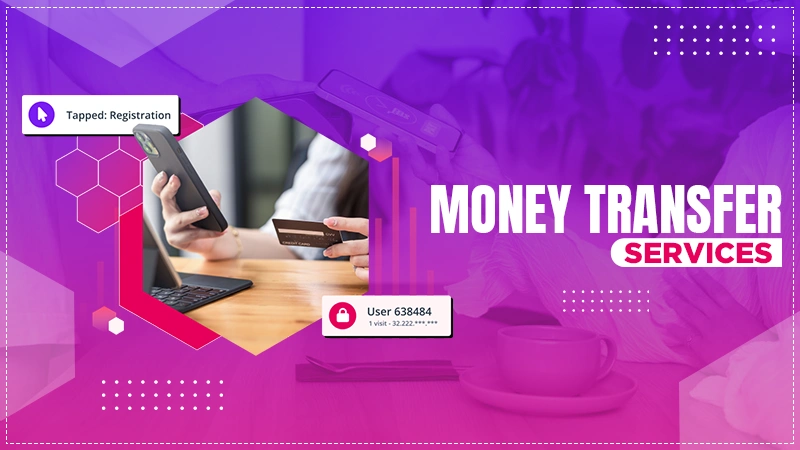Do Online Proctors Watch You?
With an exponential rise in online education over the last couple of years, the integrity of online exams remains paramount. But how do you maintain it? Or is it even possible?
Well, one efficient method that came into the limelight is using online proctors, which is a kind of examination mechanism that is used to verify the credibility of applicants and prevent them from cheating during exams.
But, is it really that efficient? Well, this read will explore the critical concepts of online proctoring along with how ProctorEdu proctored software can help you conduct an exceptional proctoring test.
Let’s start!
What is Online Proctoring?
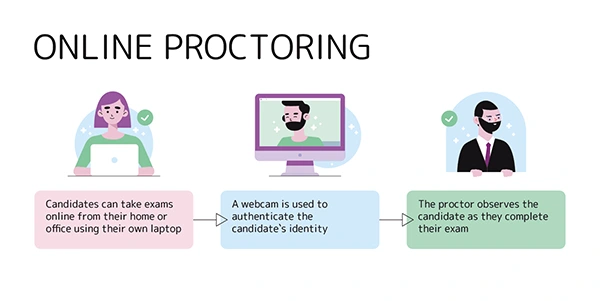
Online proctoring is a digital invigilation method, that allows students to give exams from anywhere. This is an act of supervising candidates to ensure that the exam remains fair and equal for all candidates.
And just like an in-person invigilator supervises the students during an exam, an online proctoring services does the same, but through a combination of video and audio mechanisms.
However, this whole online proctoring process can either be proctored by a specially designed algorithm or even a human invigilator, who will be constantly tracking the student’s activity to maintain the exam’s integrity.
How Does Online Proctoring Work?
Now that you have a little background on what online proctoring is, let’s take a look at how it works. There are majorly 3 ways an online proctoring can be conducted:
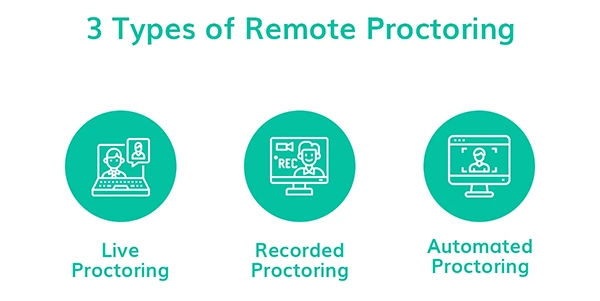
Live Proctoring
Live proctoring is similar to the traditional method, but just online. It includes a human proctor who supervises the candidate’s activity throughout the exam using a webcam, audio, and other advancements.
This is an effective model that overcomes the location limitation while allowing proctors and candidates to appear online from any place. However, this is not so fancy model and has some downsides, such as:
- Same amount of human involvement as offline methods.
- The text needs to be pre-scheduled.
- The cost of conducting a live proctoring is more expensive than other models.
Recorded Proctoring
As the name suggests, record proctoring refers to a model where a candidate’s audio and video are recorded. And later supervised by a human invigilator to track any suspicious activity.
This method overcomes the location limitation while removing the scheduling part. However, it still needs a human invigilator to review the footage, and therefore it remains expensive.
Automated Proctoring
The last, and probably the most effective, model is automated proctoring. In this method, the video and audio of the candidates are live detected by some artificial intelligence (AI) algorithms.
And if by any chance any suspicious activity is detected in the background, the system then issues a red flag by using a face recognition system.
The major plus of this model is that it overcomes all the previous challenges posed by other methods such as location limitation, scheduling, and the whole dependency on the human review.
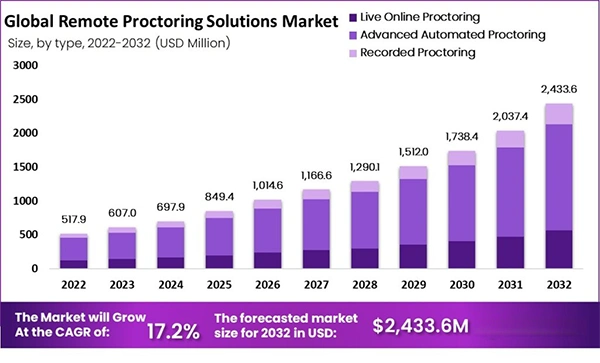
What Do Online Proctors Look For?
Online proctors track any suspicious behavior of the user conducting the exam to maintain the integrity of the text. Below are mentioned few examples of what exactly online proctors look for:
- Eye Movement: They track the student’s eye movement. And if it is frequently moving away from the system, it can indicate that the student is at some notes or other cheating device.
- Unusual Sounds: The system listens to the student’s audio and tracks unusual noises, such as other voices or typing sounds, that don’t match the student’s actions.
- Screen Activity: The system also tracks the screen activity of the students to ensure that the students are not opening other websites, applications, or documents during the exam.
- Multiple People: These online proctors make sure that only the student is present in the room and no one else is there to help them.
Do You Know?
The online proctoring market was $706 million in 2022, which is estimated to reach $1,742 million by 2028 with an average CAGR of 16%.
Benefits of Online Proctoring
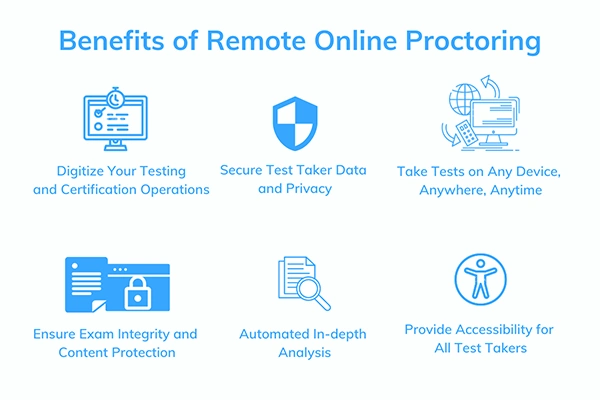
Despite overcoming the location limitations, the need for scheduling, and eliminating the requirement for human review. There are several other benefits of online proctoring, such as:
- In online proctoring, it is easy to verify students’ IDs and avoid identity theft.
- As all the candidates are closely monitored by an AI algorithm, it significantly reduces all forms of cheating.
- Online proctoring exams are easier to manage and are less expensive when compared to in-person exams.
- These tests are highly scalable, allowing you to add extra candidates even after the initial booking without requiring extra space.
- These assessments are convenient and accessible for everyone involved and can be arranged at a time to suit all the participants.
- Online proctoring allows students to take exams from the comfort of their homes without traveling to an exam center.
- And, on top of that, some research also indicates that online proctoring significantly reduces fraudulent activity during exams.
Bottom Line
In closing, online proctoring is an essential tool for maintaining the integrity of online exams. And by opting for a reputable proctoring service like ProctorEdu proctored software, invigilators can ensure that the exam conducted is fair and equal to all candidates.





